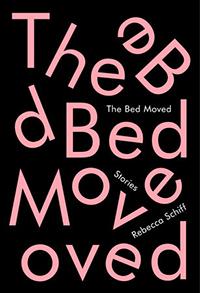
In her debut collection The Bed Moved, Rebecca Schiff emerges with the biting tongue, warm affection, and well-advised hindsight of a rom-com best friend—in the best possible way. Some of these stories found original publication in places like n+1 and Guernica as early as 2006, and ten years later this collection unleashes its pent-up, raw energy like a box of suburban secrets finally being unveiled. Through familial tensions at a Jewish funeral, “trauma groupies” for bloggers with cancer, and sexual opportunism in motor homes and nudist hot springs, Schiff’s prose coaxes us into the world of wandering Millennials. And in this world where physical intimacy comes before emotional vulnerability, generations prior serve as an obstacle and a warning, and conceptual fears maintain a higher baseline of anxiety than ever before, none of us quite know where we’re heading.
Relationships become farcical in this carnival of incomplete adulthood. Schiff’s short lines (“I made people feel good. Then I took a break. Then I forgot I was taking a break. Spring was here. Jake was here. Also Josh”) and flawlessly sewn contrasts (“I liked being stoned and naked with this man, but being sober and clothed was more challenging”) diagnose this expansive emotional disconnect endemic in American culture. This condition doesn’t seem fatal, for none of the characters make drastic changes to their behavior in light of their awareness; yet it is not completely benign, either. In this masterful collection, Schiff highlights how our interpersonal interactions often become a series of bartering tools rather than a chance to revel in each other’s shared humanity, seemingly fulfilling the immediate desperation without satisfying anyone: “There were others, guys who’d let me hopelessly cuddle them for months, years….In return I would agree to let them be depressed. Nobody had ever liked anybody.”
Two of the first stories, “Longviewers” and “_http://www.msjiz/boxx374/mpeg_,” reveal the intergenerational tensions of baby-boomer parents unable to see past their manicured lawns and their anxiety-ridden children trying to make sense of the world around them. Though embodied by overbearing parents of different forms—a father defending his idyllic estate against the plague of street traffic and an autopilot mother cloaked in passive-aggression—both resist the urge to stay in the framework of their laughable caricatures. Turning the kitchen table into the war room for a “One Way? No Way?” campaign is ludicrous, yet Schiff shows us that this passion—even after the apathy of suburbia quells the single flame—might be enough to pass the torch: “But walking home, sometimes I think I see him, one block away, planted on our sidewalk, a man with salt and pepper ringing his bald spot, a man with a windbreaker, Longview’s worst nightmare, the only man with enough love to turn the tide the other way.”
As the collection proceeds, Schiff strikes the perfect balance of humor and illumination by holding up a funhouse mirror to the peculiar habits of post-9/11 suburbanites and young professionals without condemning or excusing the culture of distraction it has created. In “World Trade Date,” Schiff’s protagonist faces this new landscape, in which everything has changed but we can no longer find ourselves:
Her office rented a therapist, even though everybody already had their own therapist. The subway told her it was okay to get help, even if you weren’t there when it happened, even if you were in Machu Picchu when it happened. She couldn’t pass a corner without a shrine, a fence that wasn’t tricked out with Xeroxes of the dead. Bears got wet in the rain. The dead looked deader Xeroxed.
The laugh that inevitably blooms forth from these pages is a translation of choked-back tears and misattributed anger. This paradox of modernity, the pathologized day-to-day and the absence of genuine intimacy, easily floods our subconscious, and it isn’t until we strip back the layers of numbness that we see the grave sadness in it. The Bed Moved leaves the reader with the realization that everyone is here by happenstance, not by any great skill or divine intervention: “She’d look from a guy’s face to the face hanging from his neck, a face that could be on a fence, but wasn’t.”
Schiff’s deft comedy is not funny for its own sake but as a foil to the undercurrents of unrest many young people feel: by-products of crisis fatigue from inescapable media consumption, relative daily security clashing with unending student loans and soulless job prospects, and the habits of self-medication by consumerism, fanaticism, or pot. We laugh at the characters for their crassness and self-centered behavior as well as their dramatic treatment of the smallest problems, yet we laugh most of all to keep from crying at the state of ourselves. Schiff is the adjunct-professor sibling at Thanksgiving dinner: not there to attack but, as an act of self-preservation, to sympathize jovially while balling her fists to keep cyclical suburbia at bay. With rhetoric of middle-class peril and unfounded, reactionary fear of everything, The Bed Moved arrives as a force to shake us without scaring us.
Kelli Ebensberger is an English and psychology student at the University of Iowa, graduating in the spring of 2016. Currently, she is on staff at Rescue Press and works with various on-campus publications such as Ink Lit Mag, earthwords, and the Iowa Review.
The Bed Moved
by Rebecca Schiff
Knopf/Penguin Random House 2016
$24.95 (hardcover); ISBN: 9781101875414
160 pages

